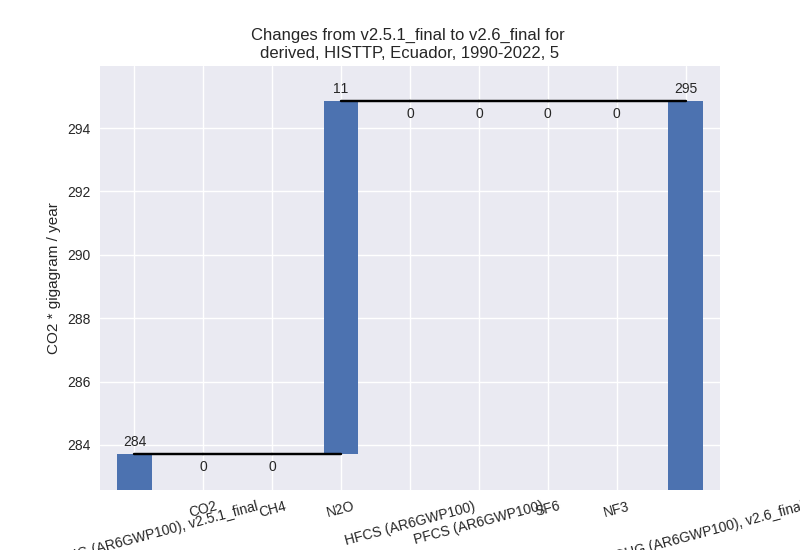Changes in PRIMAP-hist v2.6_final compared to v2.5.1_final for Ecuador
2024-09-24
Johannes Gütschow
Change analysis for Ecuador for PRIMAP-hist v2.6_final compared to v2.5.1_final
Overview over emissions by sector and gas
The following figures show the aggregate national total emissions excluding LULUCF AR6GWP100 for the country reported priority scenario. The dotted linesshow the v2.5.1_final data.
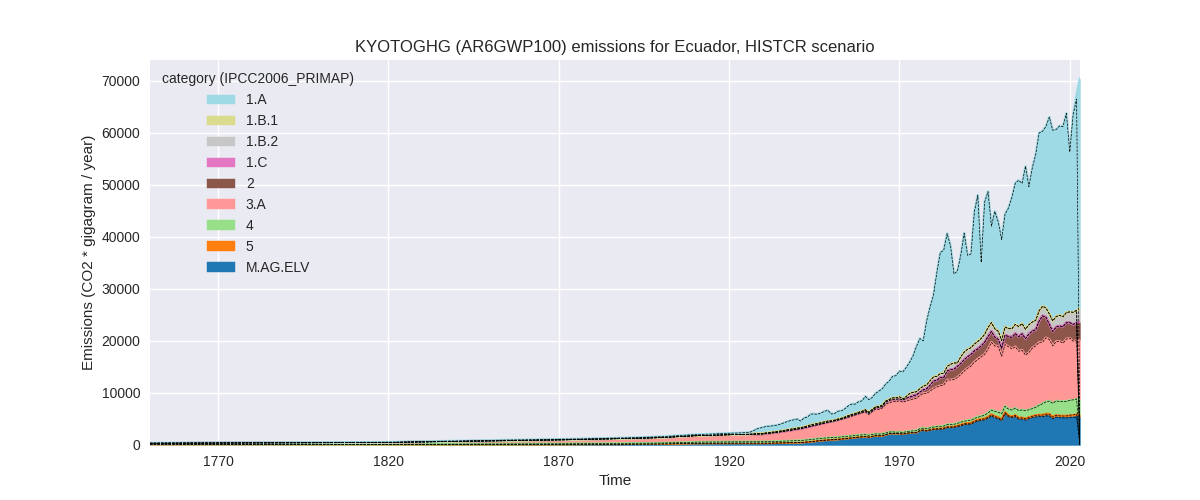
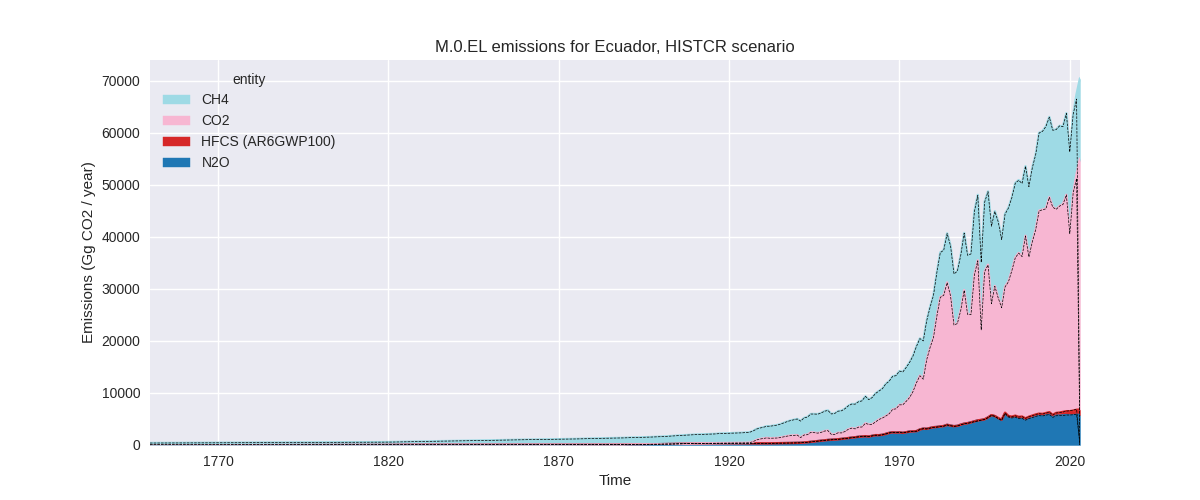
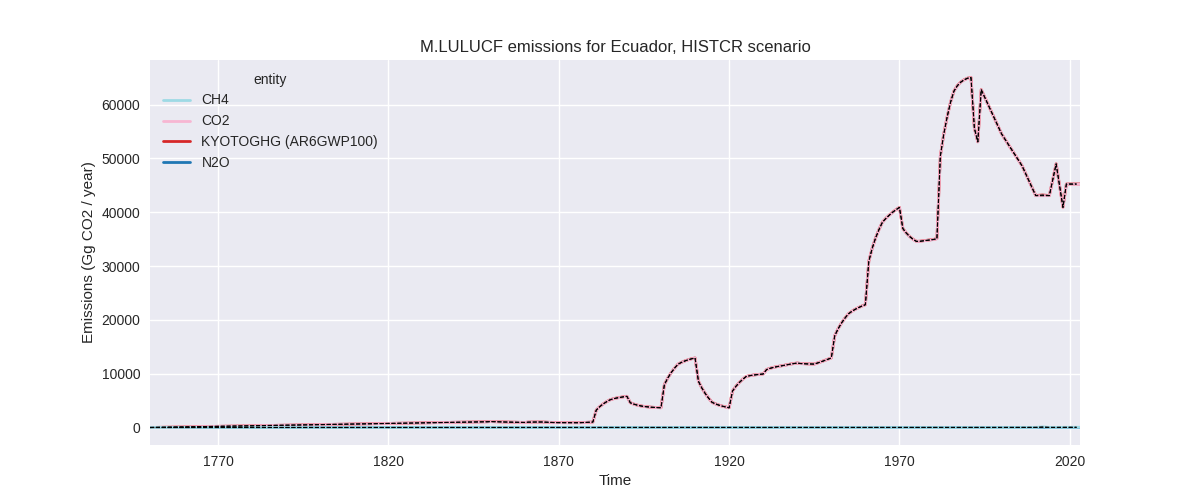
The following figures show the aggregate national total emissions excluding LULUCF AR6GWP100 for the third party priority scenario. The dotted linesshow the v2.5.1_final data.
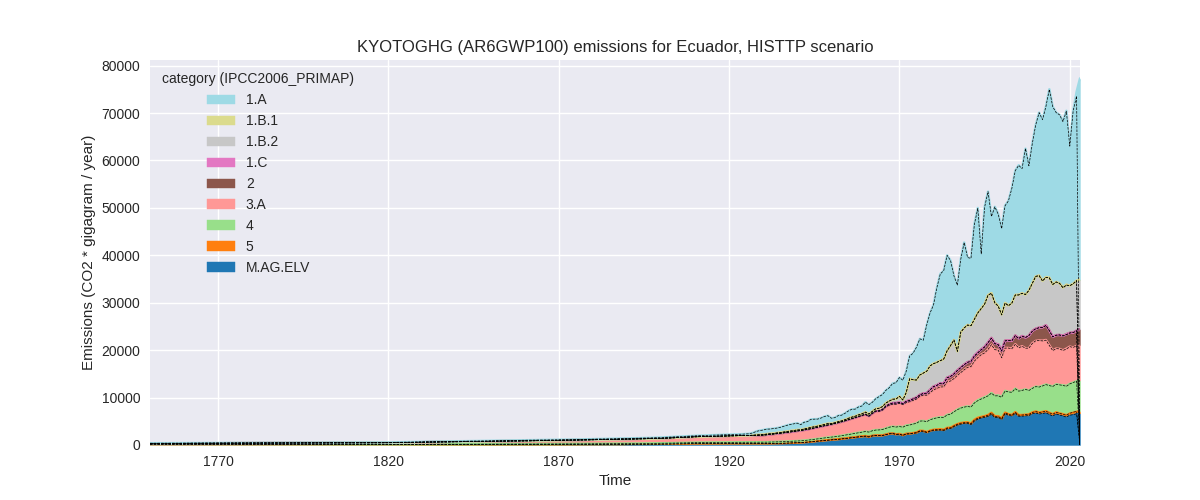
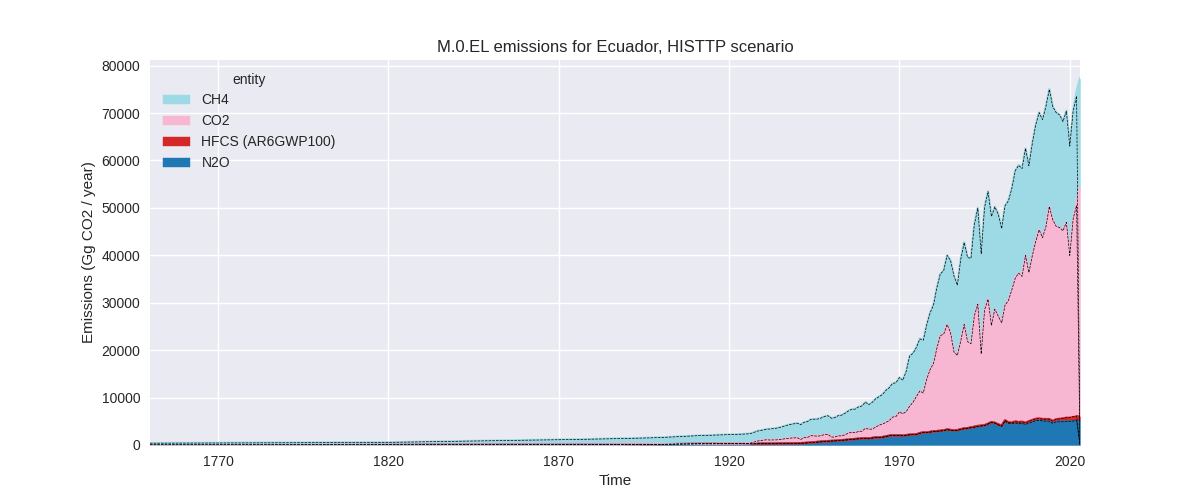
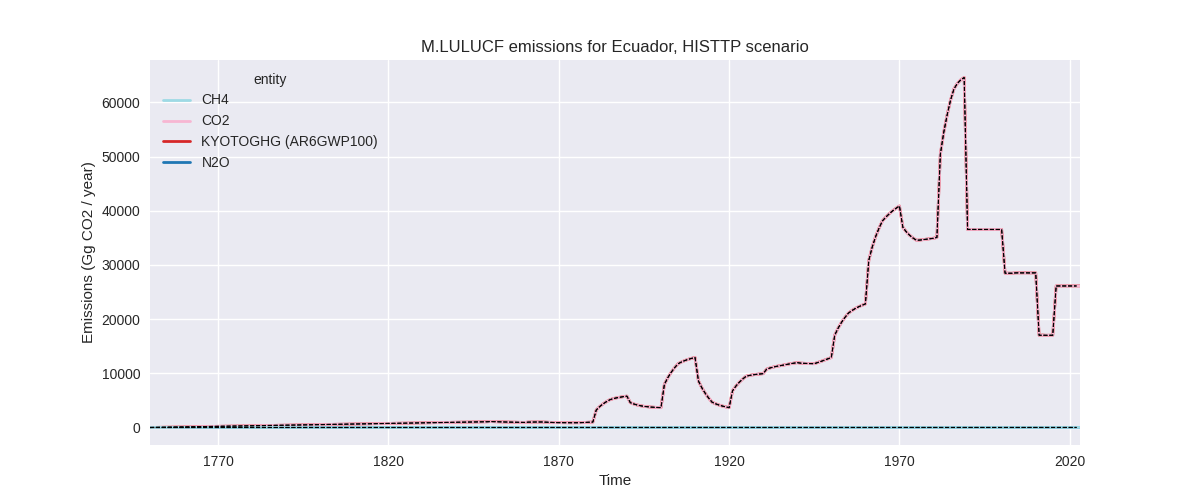
Overview over changes
In the country reported priority scenario we have the following changes for aggregate Kyoto GHG and national total emissions excluding LULUCF (M.0.EL):
- Emissions in 2022 have changed by 1.4%% (919.73 Gg CO2 / year)
- Emissions in 1990-2022 have changed by 0.1%% (58.15 Gg CO2 / year)
In the third party priority scenario we have the following changes for aggregate Kyoto GHG and national total emissions excluding LULUCF (M.0.EL):
- Emissions in 2022 have changed by 1.2%% (919.43 Gg CO2 / year)
- Emissions in 1990-2022 have changed by 0.1%% (52.01 Gg CO2 / year)
Most important changes per scenario and time frame
In the country reported priority scenario the following sector-gas combinations have the highest absolute impact on national total KyotoGHG (AR6GWP100) emissions in 2022 (top 5):
- 1: 1.A, CO2 with 963.44 Gg CO2 / year (2.4%)
- 2: 5, N2O with -109.74 Gg CO2 / year (-20.4%)
- 3: 4, CH4 with 40.85 Gg CO2 / year (1.5%)
- 4: M.AG.ELV, CO2 with 23.74 Gg CO2 / year (11.5%)
- 5: 2, HFCS (AR6GWP100) with 14.01 Gg CO2 / year (1.5%)
In the country reported priority scenario the following sector-gas combinations have the highest absolute impact on national total KyotoGHG (AR6GWP100) emissions in 1990-2022 (top 5):
- 1: 1.A, CO2 with 27.27 Gg CO2 / year (0.1%)
- 2: M.AG.ELV, CO2 with 16.95 Gg CO2 / year (10.4%)
- 3: 5, N2O with 11.14 Gg CO2 / year (3.9%)
- 4: 4, CH4 with 3.88 Gg CO2 / year (0.3%)
- 5: 4, N2O with -1.51 Gg CO2 / year (-1.0%)
In the third party priority scenario the following sector-gas combinations have the highest absolute impact on national total KyotoGHG (AR6GWP100) emissions in 2022 (top 5):
- 1: 1.A, CO2 with 923.22 Gg CO2 / year (2.4%)
- 2: 5, N2O with -109.74 Gg CO2 / year (-20.4%)
- 3: 4, CH4 with 107.22 Gg CO2 / year (1.7%)
- 4: 4, N2O with -15.29 Gg CO2 / year (-7.3%)
- 5: 2, HFCS (AR6GWP100) with 14.01 Gg CO2 / year (1.5%)
In the third party priority scenario the following sector-gas combinations have the highest absolute impact on national total KyotoGHG (AR6GWP100) emissions in 1990-2022 (top 5):
- 1: 1.A, CO2 with 26.13 Gg CO2 / year (0.1%)
- 2: 5, N2O with 11.14 Gg CO2 / year (3.9%)
- 3: 4, CH4 with 10.59 Gg CO2 / year (0.2%)
- 4: 4, N2O with 3.72 Gg CO2 / year (2.6%)
- 5: 2, HFCS (AR6GWP100) with 0.42 Gg CO2 / year (0.1%)
Notes on data changes
No country specific notes present for this changelog.
Changes by sector and gas
For each scenario and time frame the changes are displayed for all individual sectors and all individual gases. In the sector plot we use aggregate Kyoto GHGs in AR6GWP100. In the gas plot we usenational total emissions without LULUCF. ## country reported scenario
2022
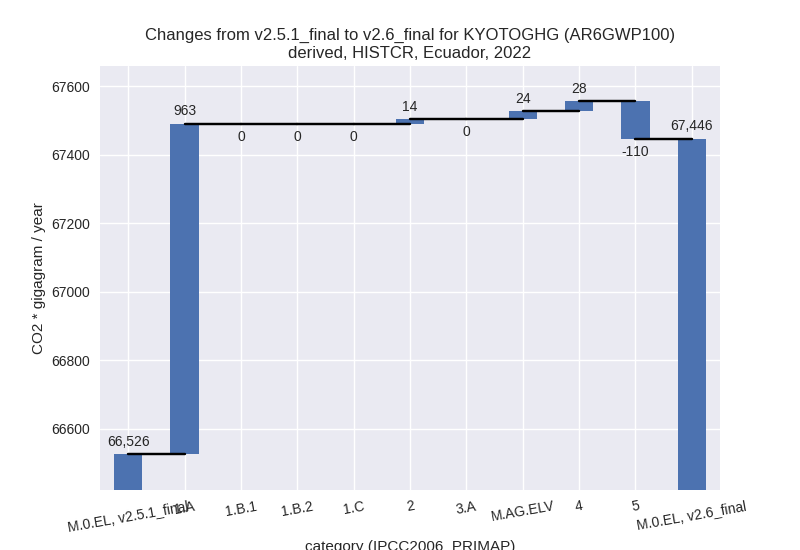
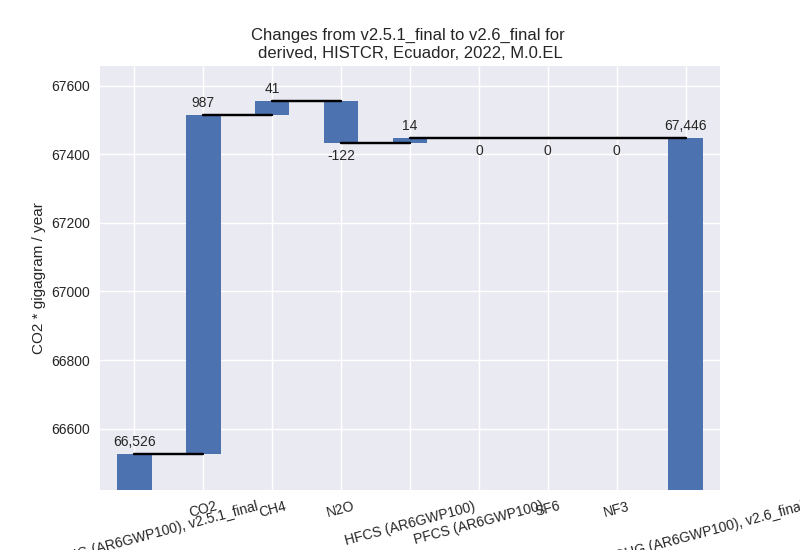
1990-2022
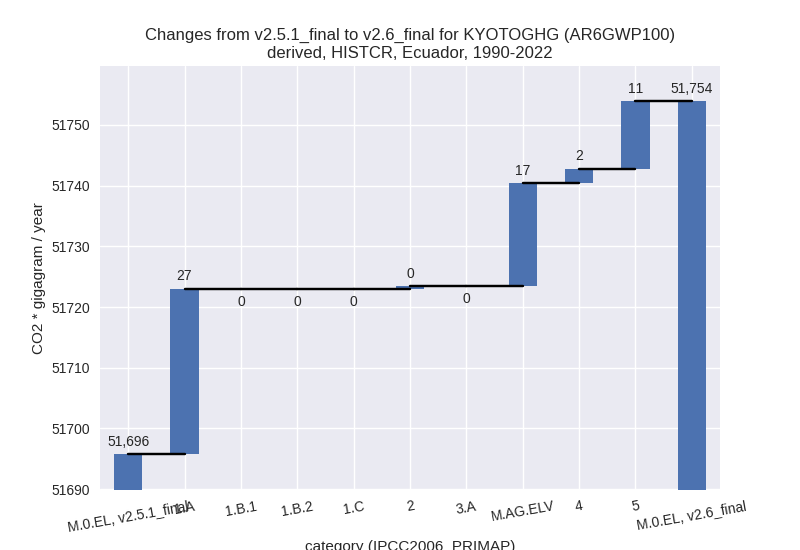
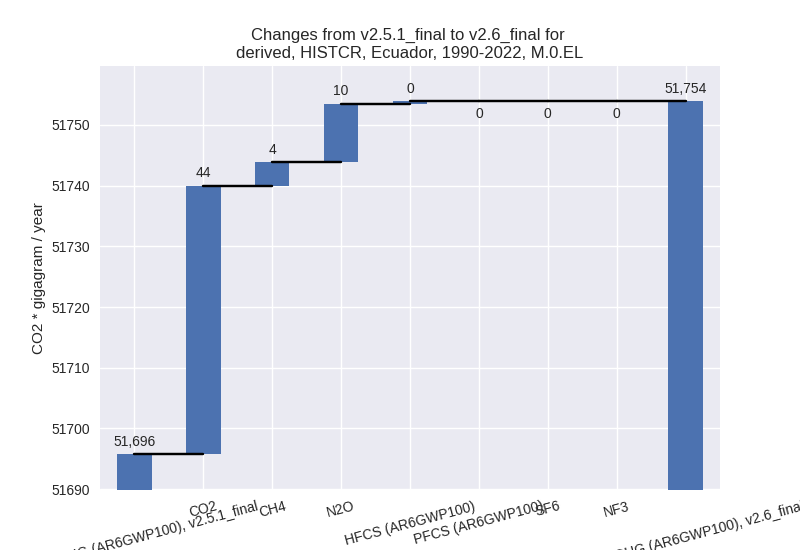
third party scenario
2022
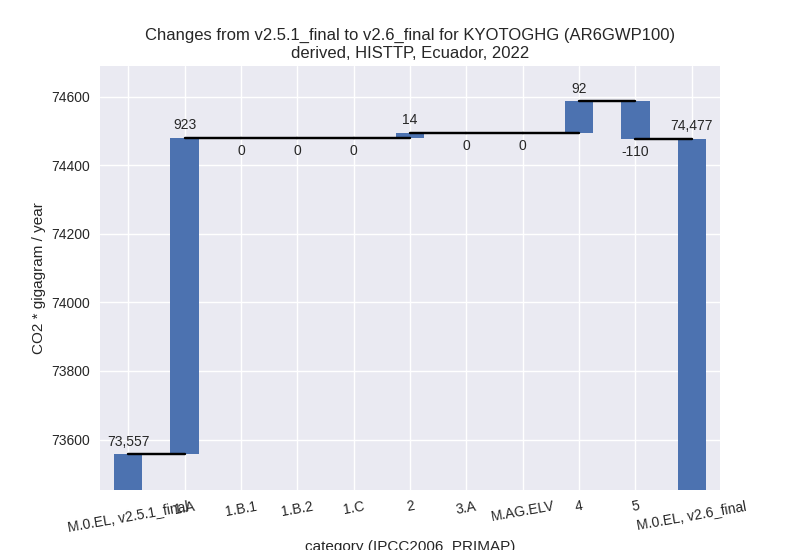
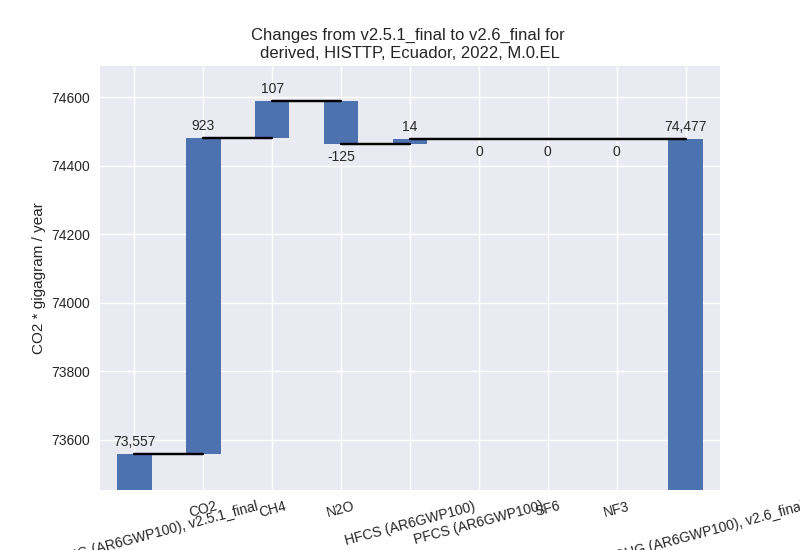
1990-2022
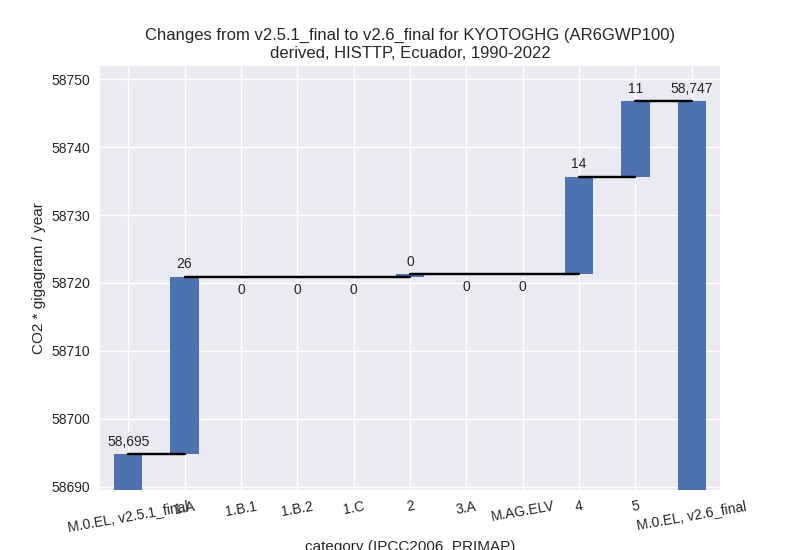
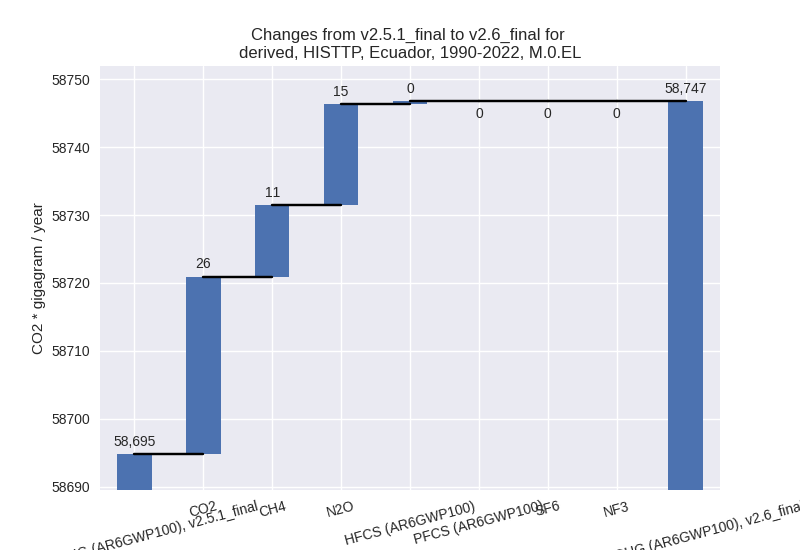
Detailed changes for the scenarios:
country reported scenario (HISTCR):
Most important changes per time frame
For 2022 the following sector-gas combinations have the highest absolute impact on national total KyotoGHG (AR6GWP100) emissions in 2022 (top 5):
- 1: 1.A, CO2 with 963.44 Gg CO2 / year (2.4%)
- 2: 5, N2O with -109.74 Gg CO2 / year (-20.4%)
- 3: 4, CH4 with 40.85 Gg CO2 / year (1.5%)
- 4: M.AG.ELV, CO2 with 23.74 Gg CO2 / year (11.5%)
- 5: 2, HFCS (AR6GWP100) with 14.01 Gg CO2 / year (1.5%)
For 1990-2022 the following sector-gas combinations have the highest absolute impact on national total KyotoGHG (AR6GWP100) emissions in 1990-2022 (top 5):
- 1: 1.A, CO2 with 27.27 Gg CO2 / year (0.1%)
- 2: M.AG.ELV, CO2 with 16.95 Gg CO2 / year (10.4%)
- 3: 5, N2O with 11.14 Gg CO2 / year (3.9%)
- 4: 4, CH4 with 3.88 Gg CO2 / year (0.3%)
- 5: 4, N2O with -1.51 Gg CO2 / year (-1.0%)
Changes in the main sectors for aggregate KyotoGHG (AR6GWP100) are
- 1: Total sectoral emissions in 2022 are 44001.53 Gg
CO2 / year which is 65.2% of M.0.EL emissions. 2022 Emissions have
changed by 2.2% (963.44 Gg CO2 /
year). 1990-2022 Emissions have changed by 0.1% (27.27 Gg CO2 / year). For 2022 the
changes per gas
are:
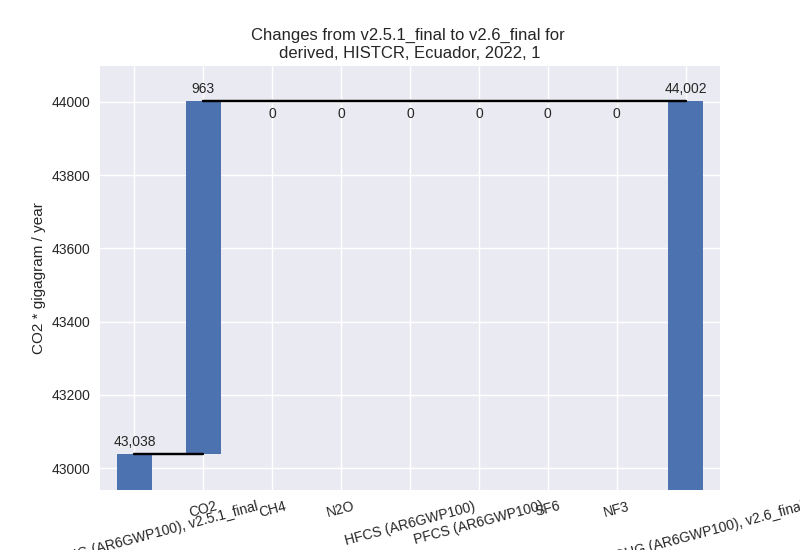
The changes come from the following subsectors:- 1.A: Total sectoral emissions in 2022 are 41587.83
Gg CO2 / year which is 94.5% of category 1 emissions. 2022 Emissions
have changed by 2.4% (963.44 Gg CO2
/ year). 1990-2022 Emissions have changed by 0.1% (27.27 Gg CO2 / year). For 2022 the
changes per gas
are:
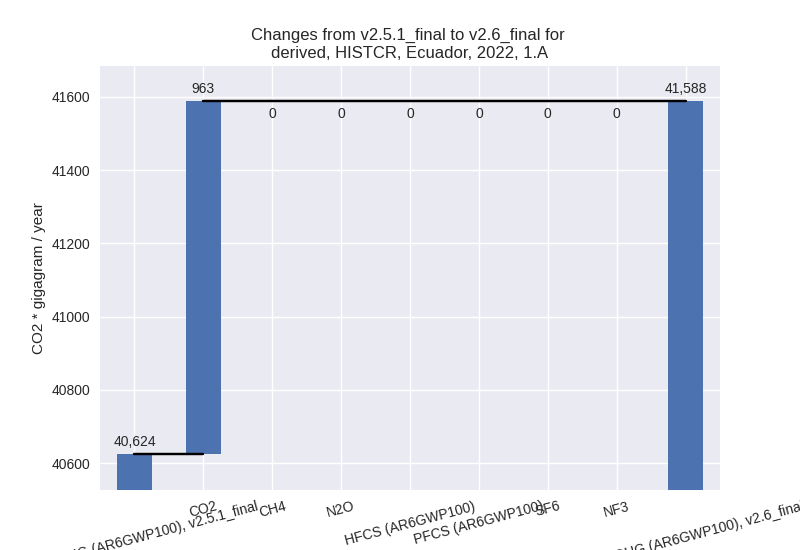
There is no subsector information available in PRIMAP-hist. - 1.B.2: Total sectoral emissions in 2022 are 2413.70 Gg CO2 / year which is 5.5% of category 1 emissions. 2022 Emissions have changed by 0.0% (0.00 Gg CO2 / year). 1990-2022 Emissions have changed by 0.0% (0.00 Gg CO2 / year).
- 1.A: Total sectoral emissions in 2022 are 41587.83
Gg CO2 / year which is 94.5% of category 1 emissions. 2022 Emissions
have changed by 2.4% (963.44 Gg CO2
/ year). 1990-2022 Emissions have changed by 0.1% (27.27 Gg CO2 / year). For 2022 the
changes per gas
are:
- 2: Total sectoral emissions in 2022 are 3282.16 Gg CO2 / year which is 4.9% of M.0.EL emissions. 2022 Emissions have changed by 0.4% (14.02 Gg CO2 / year). 1990-2022 Emissions have changed by 0.0% (0.43 Gg CO2 / year).
- M.AG: Total sectoral emissions in 2022 are 16779.13 Gg CO2 / year which is 24.9% of M.0.EL emissions. 2022 Emissions have changed by 0.1% (23.74 Gg CO2 / year). 1990-2022 Emissions have changed by 0.1% (16.95 Gg CO2 / year).
- 4: Total sectoral emissions in 2022 are 2955.15 Gg CO2 / year which is 4.4% of M.0.EL emissions. 2022 Emissions have changed by 1.0% (28.27 Gg CO2 / year). 1990-2022 Emissions have changed by 0.1% (2.37 Gg CO2 / year).
- 5: Total sectoral emissions in 2022 are 427.73 Gg
CO2 / year which is 0.6% of M.0.EL emissions. 2022 Emissions have
changed by -20.4% (-109.74 Gg CO2 /
year). 1990-2022 Emissions have changed by 3.9% (11.14 Gg CO2 / year). For 2022 the
changes per gas
are:
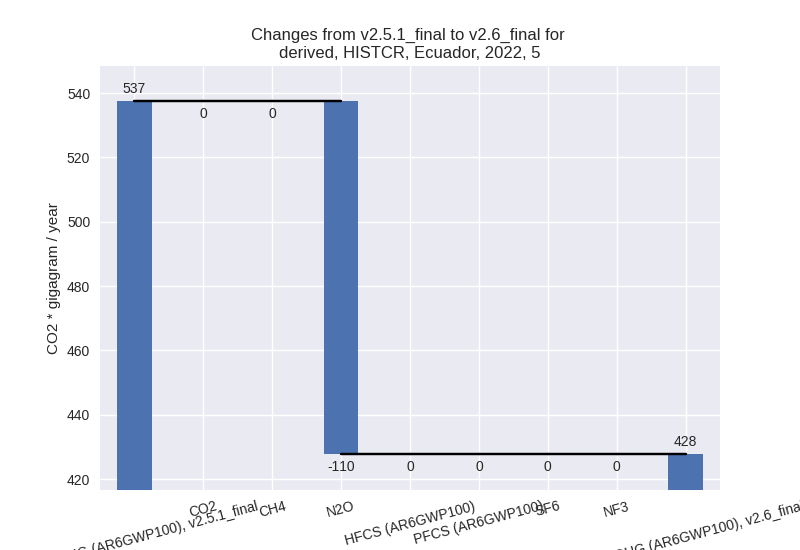
For 1990-2022 the changes per gas are: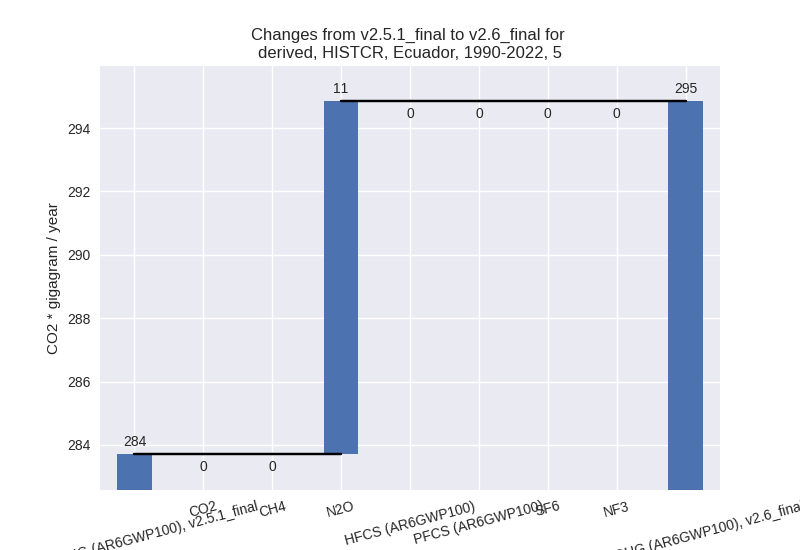
third party scenario (HISTTP):
Most important changes per time frame
For 2022 the following sector-gas combinations have the highest absolute impact on national total KyotoGHG (AR6GWP100) emissions in 2022 (top 5):
- 1: 1.A, CO2 with 923.22 Gg CO2 / year (2.4%)
- 2: 5, N2O with -109.74 Gg CO2 / year (-20.4%)
- 3: 4, CH4 with 107.22 Gg CO2 / year (1.7%)
- 4: 4, N2O with -15.29 Gg CO2 / year (-7.3%)
- 5: 2, HFCS (AR6GWP100) with 14.01 Gg CO2 / year (1.5%)
For 1990-2022 the following sector-gas combinations have the highest absolute impact on national total KyotoGHG (AR6GWP100) emissions in 1990-2022 (top 5):
- 1: 1.A, CO2 with 26.13 Gg CO2 / year (0.1%)
- 2: 5, N2O with 11.14 Gg CO2 / year (3.9%)
- 3: 4, CH4 with 10.59 Gg CO2 / year (0.2%)
- 4: 4, N2O with 3.72 Gg CO2 / year (2.6%)
- 5: 2, HFCS (AR6GWP100) with 0.42 Gg CO2 / year (0.1%)
Changes in the main sectors for aggregate KyotoGHG (AR6GWP100) are
- 1: Total sectoral emissions in 2022 are 50376.33 Gg CO2 / year which is 67.6% of M.0.EL emissions. 2022 Emissions have changed by 1.9% (923.22 Gg CO2 / year). 1990-2022 Emissions have changed by 0.1% (26.13 Gg CO2 / year).
- 2: Total sectoral emissions in 2022 are 3200.76 Gg CO2 / year which is 4.3% of M.0.EL emissions. 2022 Emissions have changed by 0.4% (14.02 Gg CO2 / year). 1990-2022 Emissions have changed by 0.0% (0.43 Gg CO2 / year).
- M.AG: Total sectoral emissions in 2022 are 14025.79 Gg CO2 / year which is 18.8% of M.0.EL emissions. 2022 Emissions have changed by 0.0% (0.00 Gg CO2 / year). 1990-2022 Emissions have changed by 0.0% (0.00 Gg CO2 / year).
- 4: Total sectoral emissions in 2022 are 6446.07 Gg CO2 / year which is 8.7% of M.0.EL emissions. 2022 Emissions have changed by 1.4% (91.93 Gg CO2 / year). 1990-2022 Emissions have changed by 0.3% (14.31 Gg CO2 / year).
- 5: Total sectoral emissions in 2022 are 427.73 Gg
CO2 / year which is 0.6% of M.0.EL emissions. 2022 Emissions have
changed by -20.4% (-109.74 Gg CO2 /
year). 1990-2022 Emissions have changed by 3.9% (11.14 Gg CO2 / year). For 2022 the
changes per gas
are:
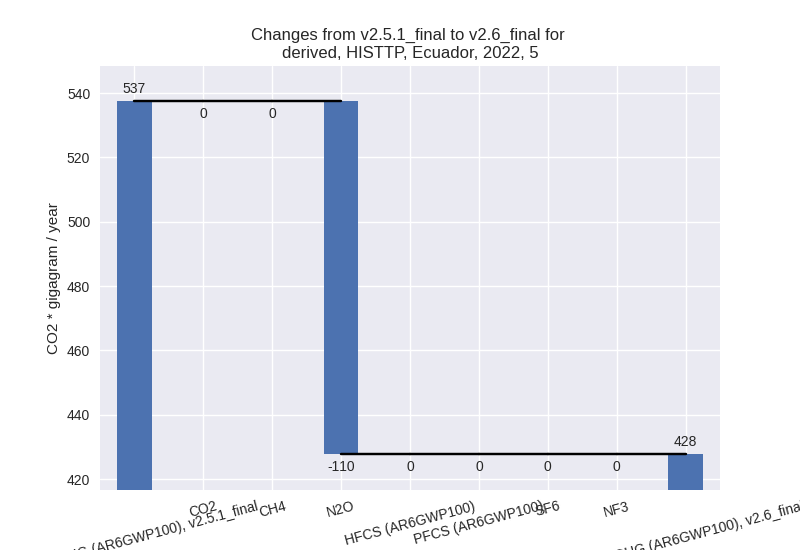
For 1990-2022 the changes per gas are: